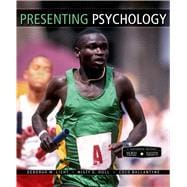
Note: Supplemental materials are not guaranteed with Rental or Used book purchases.
Purchase Benefits
What is included with this book?
Deborah Licht is a professor of psychology at Pikes Peak Community College in Colorado Springs, Colorado. She has over two decades of teaching and research experience in a variety of settings, ranging from a small private university in the midwest to a large public university in Copenhagen, Denmark. She has taught introductory psychology, psychology of the workplace, abnormal psychology, the history of psychology, child development, and elementary statistics. She has experience in traditional, online, and hybrid courses, and is particularly inspired by first-generation college students who turn to community colleges to pursue their education. She received a BS in psychology from Wright State University, Dayton, Ohio; an MS in clinical psychology from the University of Dayton; and a PhD in psychology (experimental psychopathology) from Harvard University. She continues to be interested in research on causal beliefs and their influence on behavior, particularly in relation to how college students think about their successes and failures as they pursue their degrees.
Misty Hull is a professor of psychology at Pikes Peak Community College in Colorado Springs, Colorado. She has taught a range of psychology courses at Pikes Peak Community College, including introductory psychology, human sexuality, and social psychology in a variety of delivery formats (traditional, online, and hybrid). Her love of teaching comes through in her dedication to mentoring new and part-time faculty in the teaching of psychology. She received her BS in human development and family studies from Texas Tech University in Lubbock, Texas, and an MA in professional counseling at Colorado Christian University in Lakewood, Colorado. She has served in a variety of administrative roles at Pikes Peak Community College, including interim associate dean, and coordinator of the Student Crisis Counseling Office. In addition, she has helped to facilitate the state system’s approach to teaching psychology, as the state psychology discipline chair of the Colorado Community College System from 2002 to 2010. One of her many professional interests is research on the impact of student persistence in higher education.
Coco Ballantyne is a New York–based journalist and science writer with a special interest in psychology. Before joining forces with Misty Hull and Deborah Licht to write Scientific American: Psychology and Scientific American: Presenting Psychology, Coco worked as a reporter for Scientific American online, covering the health, medicine, and neuroscience beats. She has also written for Discover magazine and Nature Medicine. Coco earned an MS from Columbia University School of Journalism, where she received a Horgan Prize for Excellence in Critical Science Writing. Prior to her journalistic career, Coco worked as a teacher and tutor, helping high school and college students prepare for standardized tests such as the SAT, GRE, and MCAT. She also worked as a physics and math teacher at Eastside College Preparatory School in East Palo Alto, California, and as a Human Biology course associate at Stanford University, where she earned a BA in human biology.
The New copy of this book will include any supplemental materials advertised. Please check the title of the book to determine if it should include any access cards, study guides, lab manuals, CDs, etc.
The Used, Rental and eBook copies of this book are not guaranteed to include any supplemental materials. Typically, only the book itself is included. This is true even if the title states it includes any access cards, study guides, lab manuals, CDs, etc.